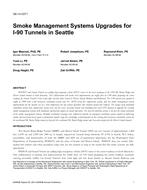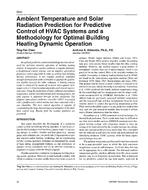Residential gas-fired cooling equipment helps electric utilities trim a portion of the summer peak load curve. Details a methodology for developing initial estimates of such peak reduction and the consequent savings in plant costs by taking into account a set of key variables. The key variables include the weather patterns over the service territory, the size and distribution of building stock for the residential sector, the availability of gas distribution lines, the market penetration of gas cooling equipment, as a fraction of the maximum possible penetration, and the historical plant cost for generating power. The application of the methodology is illustrated in detail by using a Northern California utility service territory as a case study.
KEYWORDS: year 1995, calculating, domestic, gas fired, cooling, equipment, electricity supply, summer, peak load, costs, weather, USA, load management, buildings, size, distribution, case studies, cost benefit analysis
Citation: Symposium, ASHRAE Trans. 1995, Vol.101, Part 2
Product Details
- Published:
- 1995
- File Size:
- 1 file , 1.1 MB
- Product Code(s):
- D-17306


